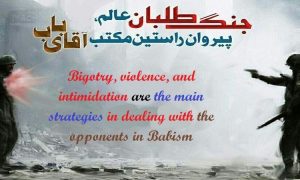Pretending to be oppressed is a strategy to attract people’s attention done by various reasons like enticing a sense of compassion and a change in people’s views. So, in order for concealing its betrayals and crimes against the Iranian people, the Baha’ism cult is using this strategy to attract public thoughts’ supports and is trying to portray a historical oppression for its creed. In this regard, the proselytizers of the Baha’ism organization are trying to introduce Babis repression during Qajar dynasty as the only result of their dissent by taking a one-sided glance at the Babi movement and to hide the true face of their ancestors behind lies.
While, the Babi and Baha’i cults (although they have been covered by affection in terms of proselytizing and medium) have been established on the basis of violence and wrath and murder is considered as an integral part of the Babi law. Of course, such violence is not unexpected when the leader of Babism creed has invited people to do this behavior in his works and the Baha’ism leader has been the agent of it (as one of the leaders of this creed)
As Ali Muhammad Bab has addressed his followers in Jihad sermon:
“یا جنود الحق علی الحرب مع المشرکین (لن تخافوا عن کثرتهم فانا قد کتبنا علب قلوبهم الرعب عنکم اقتلوا المشرکین) و لا تذروا علی الارض بالحق من الکافرین دیّاراً حتی طهرت االارض و من علیها لبقیه الله المنتظر.”
O’ righteous armies! When you fought the polytheists, do not be afraid of their abundance because we feared you in their hearts. Fight the polytheists, and do not leave on the earth any of the disbelievers until the earth and what is therein become clean out of them for the waited reminder of Allah.[1]“
So, Ali Muhammad Bab were inciting his followers to fight against the opponents constantly; although he was in Chehrigh prison before and after his imprisonment. The intensity of Bab’s action in encouraging the Babis to murder and violence was to such an extent that Ishragh Khawari writes in the book the treasury of limitations and commandment: “The ruling of Jihad against infidels and the emphasis on the severity of their behavior has continually and repeatedly mentioned in the book the interpretation of Yosof chapter.[2]“
[۱] Ali Muhammad Shirazi, Qayyoumul Asma’a, Babis publishing house, Jihad chapter (chapter: 98), p. 311.
[۲] Ishragh Khawari, the treasury of limitations and commandments, the electronic copy, p. 272.






